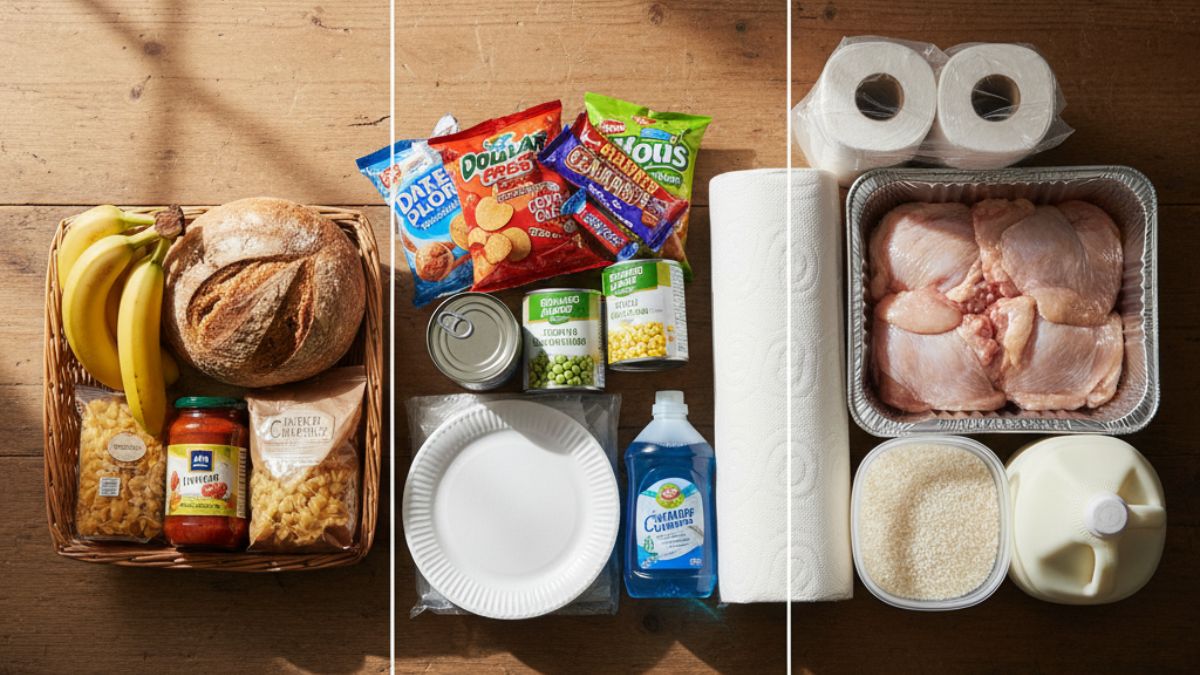Best Discount Stores for Budget Shoppers (Aldi, Dollar Tree, Costco)
For families living on one income, grocery shopping can feel like a constant battle between cost and quality. Single parents in particular need stores that deliver real value without sacrificing too much time or nutrition. Aldi, Dollar Tree, and Costco are three of the most popular destinations for budget shoppers. Each offers unique advantages, but knowing when and how to shop at each one is key to saving money and keeping meals affordable. This article takes a detailed look at these discount giants so you can make informed choices for your family.
TLDR: Best Discount Stores for Budget Shoppers
- Aldi: Best for weekly budget grocery shopping with consistently low produce and pantry prices.
- Dollar Tree: Great for non-perishables, snacks, and household basics at $1.25 each — but quality varies.
- Costco: Best for bulk buying of staples, meat, and paper goods if you have storage space and can handle upfront costs.
- Mix and match: Many families use Aldi for weekly groceries, Costco for bulk items once a month, and Dollar Tree for snacks and essentials.
Bottom line: There is no single “best discount store.” The smartest approach is combining Aldi, Dollar Tree, and Costco to maximize savings depending on what your family needs.
Why Discount Stores Matter for Budget Shoppers
According to the USDA Food Plans, the average cost of feeding a family of four ranges from $974 to $1,563 per month depending on the plan. For a single parent, those numbers are intimidating. Discount stores like Aldi, Dollar Tree, and Costco offer different ways to cut grocery costs, but they work best when you understand their strengths and limitations.
Aldi: Affordable Freshness Every Week
Strengths
Aldi has earned a reputation for being one of the best discount stores for families who want fresh, affordable groceries. With a focus on private-label brands, Aldi keeps costs low while maintaining good quality. Their weekly produce deals and rotating “Aldi Finds” aisle give shoppers opportunities for both essentials and surprises.
Best Buys at Aldi
- Fresh produce (bananas, carrots, potatoes, apples)
- Store-brand dairy (milk, yogurt, cheese)
- Pasta, rice, and canned goods
- Frozen vegetables
Shopping Scenario
One week’s worth of staples for a family of three — milk, eggs, bread, pasta, canned tomatoes, fresh vegetables, and chicken thighs — can come in under $50 at Aldi, compared to $70–$80 at many national chains.
For meal planning inspiration, check out our guide: How to Feed a Family of 3 on $100 a Week.
Dollar Tree: Stretching Every Dollar
Strengths
Everything at Dollar Tree is $1.25, making it one of the easiest places to calculate your spending. It is ideal for non-perishables, snacks, and household basics. While not the place for fresh produce, Dollar Tree shines when you need pantry fillers or quick kid-friendly snacks.
Best Buys at Dollar Tree
- Dry pasta, rice, and beans
- Snacks and juice boxes for lunchboxes
- Spices and condiments
- Cleaning supplies and household goods
Shopping Scenario
A single mom might stop at Dollar Tree to pick up 10 items for school lunches — granola bars, pretzels, juice boxes, applesauce cups — spending $12.50 for a week’s worth of snacks compared to $20–$25 at a supermarket.
However, quality can be inconsistent. Consumer Reports suggests checking expiration dates and comparing unit sizes before stocking up.
Costco: Bulk Savings with Strategy
Strengths
Costco works best for families who can afford the upfront cost of a membership and have space to store bulk purchases. While you pay more at checkout, the per-unit price is often the lowest available. Costco’s Kirkland brand is consistently praised for quality.
Best Buys at Costco
- Meat and poultry in bulk packs
- Paper products (toilet paper, paper towels)
- Cheese, yogurt, and other dairy in large tubs
- Frozen fruit and vegetables
Shopping Scenario
A $25 pack of chicken thighs at Costco might seem high, but portioned and frozen, it provides 6–7 meals for a family of three. That breaks down to roughly $3.50 per meal for the protein component, which is cheaper than smaller packs at most stores.
For budget-friendly recipes using bulk ingredients, see Budget Bytes.
Side-by-Side Comparison
| Category | Aldi | Dollar Tree | Costco |
|---|---|---|---|
| Best For | Weekly fresh groceries and staples | Snacks, non-perishables, and basics | Bulk meat, paper goods, and family staples |
| Average Weekly Spend | $50–$70 | $10–$20 (add-on trips) | $150+ per trip (bulk) |
| Biggest Savings | Produce and private-label pantry items | Snack packs, condiments, household items | Meat, dairy, and paper goods in bulk |
| Watch Outs | Limited brand variety | Smaller package sizes, inconsistent quality | Membership fee, large upfront spend |
How to Combine Stores for Maximum Savings
The best strategy is not choosing one store, but combining them. Many single parents shop weekly at Aldi for fresh groceries, stock up at Costco once a month for bulk items, and stop at Dollar Tree as needed for snacks and basics. By blending these approaches, you capture the strengths of each store while avoiding their weaknesses.
FAQ: Discount Store Shopping
Which store is cheapest overall?
Aldi typically offers the lowest weekly grocery bill. Dollar Tree wins for snacks and household basics, while Costco offers the lowest per-unit price if you can handle bulk buying.
Is Costco worth it for single parents?
Yes, if you buy staples you use frequently and can store bulk items. The membership pays for itself quickly with paper products, dairy, and meat, but it may not be worth it if you do not have freezer or pantry space.
What should I never buy at Dollar Tree?
Fresh food, vitamins, and electronics are often poor quality at Dollar Tree. Stick with pantry staples, snacks, and cleaning supplies.
How do I decide which store to shop at weekly?
Use Aldi for weekly groceries, Dollar Tree for snacks or basics, and Costco monthly or quarterly for bulk staples. Tailor the mix to your budget and storage space.
Final Takeaway
The best discount stores offer different advantages, and there is no one-size-fits-all answer. Aldi, Dollar Tree, and Costco each help families save money in their own way. The real power comes from combining them — using Aldi for weekly essentials, Costco for bulk staples, and Dollar Tree for snacks and basics. With a little planning, single parents can create a smart shopping routine that cuts costs, saves time, and keeps the family fed without financial stress.










